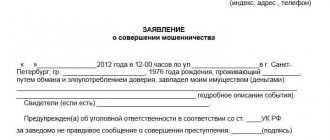Legal consultation > Administrative law > Paperwork > Complaint about inaction of the prosecutor's office: sample, details on drafting and filing the paper
Most citizens of the Russian Federation know that the government agency that supervises the activities of any organizations and authorized persons is the prosecutor's office.
In fact, it is this structure that must monitor the competence of the functioning of certain entities and the people working in them. Despite this, there are cases when the activities of the prosecutor's office itself require attention from higher authorities, for example, due to its inaction.
Today we’ll talk in more detail about where to file a complaint under such circumstances, how to carry out the procedure correctly and what nuances it has. Interesting? Then be sure to read the article below to the end.
Grounds for filing a complaint
According to the provisions of Art.
10 Federal Law 2202-1, the prosecutor's office considers issues regarding applications, complaints and other requests related to violations of laws. Therefore, you should complain to the prosecutor’s office if there is non-compliance with legal requirements on someone’s part. You can file a complaint with the prosecutor, for example, about the inaction of the police, prosecutor or investigator. Detailed instructions on the procedure for considering citizens' appeals were approved by Order of the Prosecutor General's Office dated January 30, 2013 No. 45.
Who can you complain about?
Failure to comply with legal requirements and violation of human rights and freedoms can occur in a wide variety of life circumstances. Therefore, the circle of organizations and individuals whose actions (inactions) the prosecutor needs to complain about is practically unlimited. You can file a complaint with the prosecutor's office:
- to the employer;
- to the management company;
- on the actions of officials;
- to the tax office;
- for a doctor;
- for a notary;
- to the judge;
- for the teacher
and so on.
You can even complain about a prosecutor's office employee to a higher prosecutor. At the same time, you should be aware of the nuances, taking into account which you should contact the prosecutor’s office. For example, a complaint about non-execution of a court decision, if it is not executed voluntarily by the person against whom the decision was made, for example, on the payment of alimony, should be sent to the bailiff service. If, after such an appeal, the non-execution of the court decision is a consequence of insufficient measures taken by the bailiff, then you need to file a complaint with the prosecutor's office about the inaction of the bailiffs.
Nothing bad will happen if the complaint to the prosecutor is sent to the wrong address. In this case, the applicant will receive a notification from the prosecutor's office that the application will be forwarded to another agency within its competence. But if the issue requires an urgent solution, then the addressee should be chosen carefully.
When can you contact your superiors?
If the prosecutor considering the case fails to act or makes decisions that give reason to believe that the guaranteed rights of the applicant will be harmed, then the latter has the right to appeal to higher authorities.
In fact, seeking help to restore justice is allowed in any situation. This may be a failure by the prosecutor to fulfill his immediate duties or a violation of the rights of a citizen in custody. At the same time, the appeal is not a basis for refusal to protect rights in court.
Any applicant must remember that it is possible to appeal against the actions or inaction of the prosecutor only if there is absolute confidence that he is right. It should be remembered that Art. 306 of the Criminal Code provides for liability for false denunciation.
How to write correctly
The legislation does not establish any detailed requirements for the form and content of complaints sent to prosecutors. Therefore, in order to correctly write a complaint to the prosecutor’s office, you need to be guided by the requirements of the Federal Law No.
05/02/2006 No. 59-FZ “On Citizens’ Appeals”. According to Part 1 of 59-FZ, in the application:
- indicate the name of the body or position and full name of the official, full name and postal address of the applicant to which the response will be sent (anonymous complaints are not considered by the prosecutor's office, in some cases a telephone and/or E-mail will also be required mail);
- the essence of the complaint and demands are stated (in this case, to conduct an inspection and, based on its results, take prosecutorial response measures);
- a personal signature and date are placed.
The application must be accompanied by materials that substantiate the essence of the complaint; these can be originals or copies of documents, photos and scans of smartphone and computer screens, audio and video materials.
Some believe that filing a complaint with the Prosecutor General's Office is more effective than the same appeal to the district or city prosecutor's office, but this is not entirely true. Such an appeal will be transferred for consideration to the lower prosecutor's office within its competence. Of course, if the President or Prime Minister of the Russian Federation applies to the Prosecutor General’s Office, then such an appeal will not be sent anywhere.
We strongly advise you to contact a lawyer on our website to competently draw up a complaint and send it to the prosecutor. He has extensive practical experience in drawing up and sending complaints to the prosecutor's office, most of which have received positive results.
Deadlines for consideration of applications
There are two types of deadlines for considering a complaint: general and shortened. The total is 30 days. These are statements that do not require the prosecutor to immediately respond to the current situation. Shortened period – 15 days. The issue under consideration is accelerated if the essence of the case stated in the application does not require the official to conduct an additional check.
The timing of a specific request is influenced by several factors:
- The need to consider a controversial case by lower-level law enforcement agencies.
- Hollow or partial restoration of the violated rights of a citizen or group of persons.
- The need to carry out explanatory work on the complaint materials.
How to file a complaint with the prosecutor's office
As we have already found out, there is no particular point in complaining to the Prosecutor General of the Russian Federation. In order to properly file a complaint with the prosecutor’s office, you need to understand which agency of this department you should contact. Law 2202-1 says nothing about this, but Part 1 of Art. 8 59-FZ states that the appeal is sent to the body (official) whose competence includes resolving the issues raised in the appeal.
In practice, complaints, including collective complaints, are filed at the location of the person whose actions are being appealed, or at the place of residence (location) of the applicants. If necessary, the complaint will be forwarded within the department to the appropriate authority. According to clause 2.1 of Instruction 45, the prosecutor's office considers applications received:
- through the Internet;
- at a personal reception;
- by mail, telegraph, fax;
- through the media.
Online
Nowadays, filing a complaint with the prosecutor’s office online is not difficult at all. The only condition is that in order to send a complaint to the prosecutor’s office electronically, you need to have an account on the State Services portal. To file a complaint directly through State Services you should:
- Log in to the portal.
- Go to the section “Service for submitting citizens’ appeals to the prosecutor’s office of the Russian Federation.”
- Click on the “Submit an Appeal” link.
- Fill out the appeal form, indicating the necessary information and outlining the essence of the complaint.
- Click on the “Submit Appeal” button.
It is also possible to submit a complaint to the prosecutor's office via the Internet on the official website of the department. To do this you need:
- Open the website of the Prosecutor General's Office.
- Click on the menu item “Internet reception”.
- Log in through the State Services portal.
- Send a complaint to the prosecutor's office via the Internet according to the above described scheme.
The advantage of this method of sending an appeal is obvious: it can be done from home or office, and through a smartphone - from any place where there is Internet access.
During a personal visit
You can write an application to the prosecutor's office at a personal appointment with the department. The personal reception procedure is regulated by Section 7 of Instruction 45. Here are excerpts from this document:
- personal reception of citizens is carried out according to the approved schedule throughout the working day;
- the head of the prosecutor's office receives citizens at least once a week;
- a citizen who comes to a personal reception must present his passport to the employee receiving him;
- the content of the oral appeal is entered into the database or visitor registration book;
- o is placed on written applications, including on copies at the request of the applicant.
To avoid waiting in line, it is best to make an appointment in advance. This can be done on the State portal. The main advantage of a personal appointment is the opportunity to communicate with a specialist and receive clarification from him on all emerging issues related to the form and substance of the complaint.
By mail
Clause 2.1 of Instruction 45 provides for the consideration of complaints received by the prosecutor's office by mail. A signed statement must be enclosed in the mailing along with materials confirming the substance of the complaint.
Via the Internet - instructions
A complaint against the prosecutor’s office can be filed on the official website genproc.gov.ru in the “Internet reception” .
The system will provide a special application form in which you must carefully select specific sections.
Required items will be marked .
If there is not enough information, the complaint will not be sent. The correctness or incorrectness of the entered data is confirmed by special notifications from the system.
Algorithm for working with the Internet reception:
- select the type of request (the system will offer several options);
- indicate the type of appeal (general or report of corruption);
- enter the applicant’s full name (there is a separate line for each type of data);
- select the applicant’s region of residence from the list;
- indicate the response delivery method (there are several options);
- be sure to provide an email address;
- enter the main text of the complaint (special line);
- upload additional documents (if available);
- enter the verification code indicated in the special picture;
- confirm sending the complaint.
to contents
How should the prosecutor's office respond to the appeal?
The complaint received by the prosecutor's office is considered and a preliminary decision is made on it according to one of the following options:
- accept for resolution;
- leave without permission;
- submit for permission to a lower authority;
- redirect to other authorities;
- terminate consideration;
- attach to a previously received appeal;
- return to the applicant.
If the appeal is accepted for resolution, the prosecutor's office conducts an investigation into the complaint. During the inspection, the prosecutor has the right to request documents and materials, gain access to institutions and organizations to verify compliance with the laws (Article 22 of Law 2202-1).
Based on the results of consideration of the complaint, the prosecutor's office will make a decision. If the inspection reveals violations of laws and/or the applicant’s rights, prosecutorial response measures are taken, including:
- protesting normative acts that contradict the law, going to court (arbitration court) with a demand to recognize such acts as invalid;
- submitting a proposal to eliminate violations of the law.
The response of the prosecutor's office to a citizen's complaint must contain information about the decision taken on it with justification, as well as about prosecutorial response measures, if such measures were taken.
When can a refusal occur?
We indicated above that a citizen can write a complaint against the prosecutor’s response. An example of it is given in the text. Complaints against a prosecutor's decision to a higher prosecutor are drawn up in exactly the same way. They are not always considered. The most common reasons for refusal include:
- The applicant's handwriting is so unclear that it is impossible to read the text. The refusal in this case must be sent within 7 days from the date of registration of the application.
- The complaint was submitted anonymously (except for the report of an impending crime).
- The message contains profanity, insults, and threats.
- They will not consider a complaint that is devoid of logic (it is impossible to understand from the text what demands are being made).
- The applicant was declared legally incompetent due to mental illness.
The complaint will remain unanswered if its preparation requires the disclosure of state secrets.
Termination of correspondence
You need to know how to properly file a complaint against the prosecutor’s inaction. Even if all requirements are met, correspondence with the applicant may be stopped. This occurs if the appeal is sent again after it has been reviewed and a response has been provided. However, the second complaint does not contain new facts, information about the inaction or unlawful actions of the prosecutor.
Regarding the termination of correspondence, the higher authority must send a response to the applicant within 40 days from the date of registration of the appeal.
For what reasons can I complain?
There can be many reasons, but the most common are the following:
- A police officer (precinct) acts unlawfully, violates the law, acts not in accordance with the regulations, exerts pressure;
- Law enforcement officers did not come when called,
- The employees accepted the statement that a crime had been committed, but were in no hurry to carry out verification activities;
- If a check on the application was carried out, but rather superficially and formally, and based on its results, the initiation of a criminal or administrative case was refused;
- If the police fail to act in other situations;
- If, after the initiation of a criminal case, police officers do not carry out the necessary investigative measures and rush to quickly close it and put it in the archives;
- Employees of internal authorities behave defiantly and not in accordance with the regulations.
In the above situations, it is highly undesirable to delay writing an appeal to the supervisory authorities, therefore measures must be taken without delay.










